Deck 4: Extrema on an Interval
Question
Question
Question
Question
Question
Question
Question
Question
Question
Question
Question
Question
Question
Question
Question
Question
Question
Question
Question
Question
Question
Question
Question
Question
Question
Question
Question
Question
Question
Question
Question
Question
Question
Question
Question
Question
Question
Question
Question
Question
Question
Question
Question
Question
Question
Question
Question
Question
Question
Question
Question
Question
Question
Question
Question
Question
Question
Question
Question
Question
Question
Question
Question
Question
Question
Question
Question
Question
Question
Question
Question
Question
Question
Question
Question
Question
Question
Question
Question
Question

Unlock Deck
Sign up to unlock the cards in this deck!
Unlock Deck
Unlock Deck
1/147
Play
Full screen (f)
Deck 4: Extrema on an Interval
1


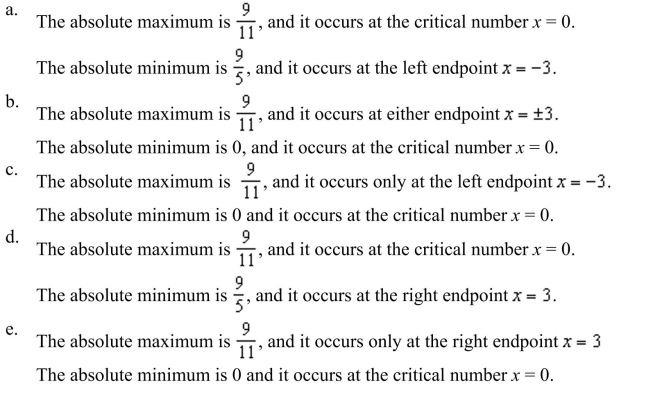
A
2
Locate the absolute extrema of the function 

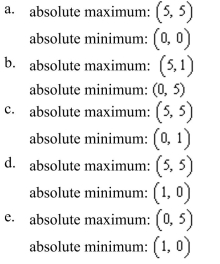



D
3


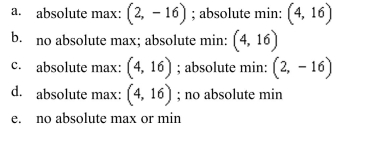
C
4
 extremum.
extremum. 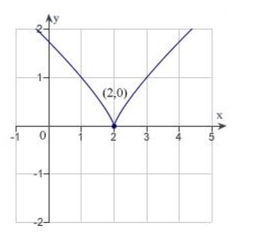
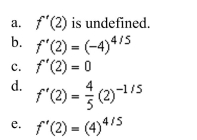

Unlock Deck
Unlock for access to all 147 flashcards in this deck.
Unlock Deck
k this deck
5



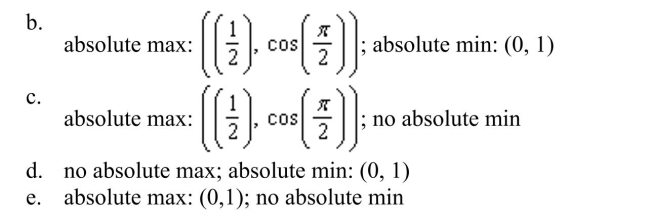

Unlock Deck
Unlock for access to all 147 flashcards in this deck.
Unlock Deck
k this deck
6


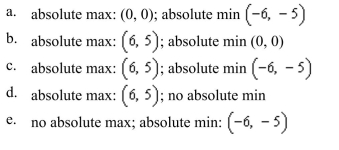

Unlock Deck
Unlock for access to all 147 flashcards in this deck.
Unlock Deck
k this deck
7


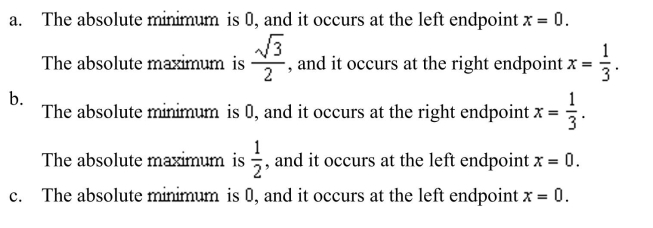
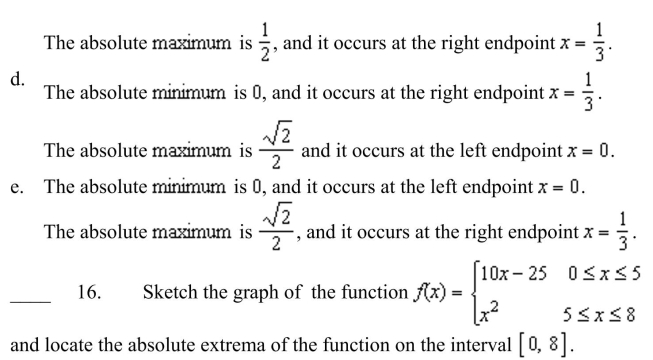
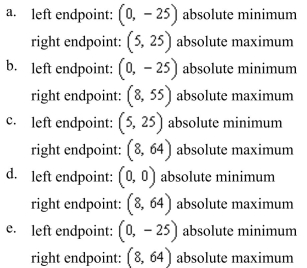

Unlock Deck
Unlock for access to all 147 flashcards in this deck.
Unlock Deck
k this deck
8
Determine whether Rolle's Theorem can be applied to the function 




Unlock Deck
Unlock for access to all 147 flashcards in this deck.
Unlock Deck
k this deck
9
any critical numbers of the function 
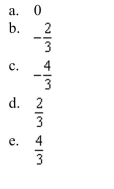



Unlock Deck
Unlock for access to all 147 flashcards in this deck.
Unlock Deck
k this deck
10


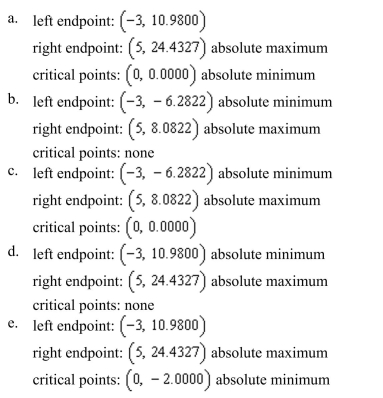

Unlock Deck
Unlock for access to all 147 flashcards in this deck.
Unlock Deck
k this deck
11

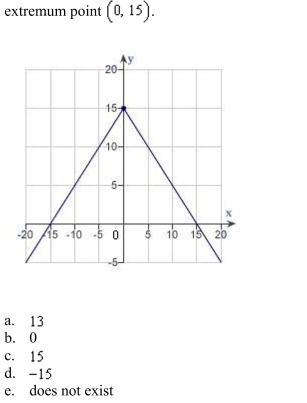

Unlock Deck
Unlock for access to all 147 flashcards in this deck.
Unlock Deck
k this deck
12



Unlock Deck
Unlock for access to all 147 flashcards in this deck.
Unlock Deck
k this deck
13

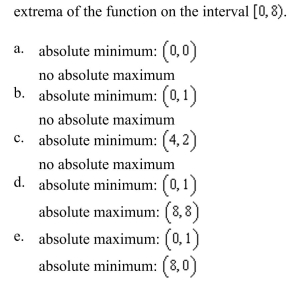

Unlock Deck
Unlock for access to all 147 flashcards in this deck.
Unlock Deck
k this deck
14
 extremum point .
extremum point . 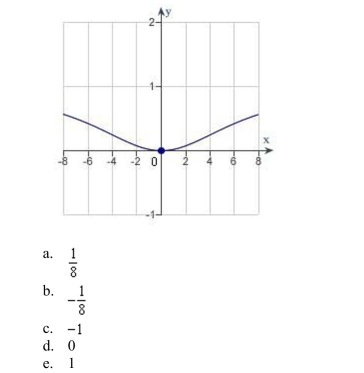

Unlock Deck
Unlock for access to all 147 flashcards in this deck.
Unlock Deck
k this deck
15
a graphing utility to graph the function  absolute extrema of the function on the interval
absolute extrema of the function on the interval 
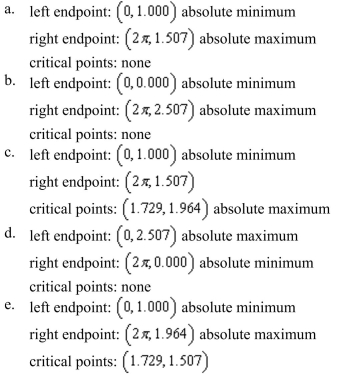
 absolute extrema of the function on the interval
absolute extrema of the function on the interval 


Unlock Deck
Unlock for access to all 147 flashcards in this deck.
Unlock Deck
k this deck
16

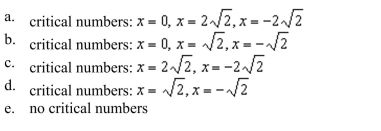

Unlock Deck
Unlock for access to all 147 flashcards in this deck.
Unlock Deck
k this deck
17
all critical numbers of of the function 
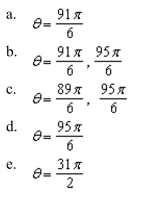



Unlock Deck
Unlock for access to all 147 flashcards in this deck.
Unlock Deck
k this deck
18
a computer algebra system to graph the function  absolute extrema on the interval
absolute extrema on the interval 
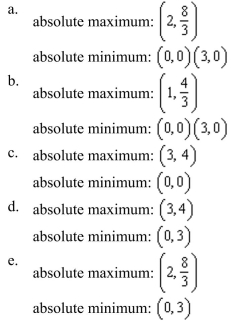
 absolute extrema on the interval
absolute extrema on the interval 


Unlock Deck
Unlock for access to all 147 flashcards in this deck.
Unlock Deck
k this deck
19
Locate the absolute extrema of the function 

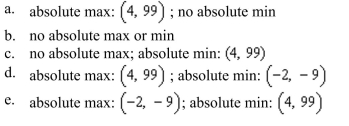




Unlock Deck
Unlock for access to all 147 flashcards in this deck.
Unlock Deck
k this deck
20

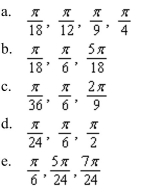

Unlock Deck
Unlock for access to all 147 flashcards in this deck.
Unlock Deck
k this deck
21
height of an object t seconds after it is dropped from a height of 550 meters is 


Unlock Deck
Unlock for access to all 147 flashcards in this deck.
Unlock Deck
k this deck
22
Identify the open intervals where the function  decreasing.
decreasing. 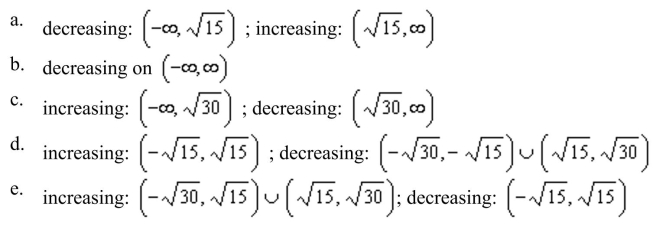
 decreasing.
decreasing. 

Unlock Deck
Unlock for access to all 147 flashcards in this deck.
Unlock Deck
k this deck
23
company introduces a new product for which the number of units sold S is 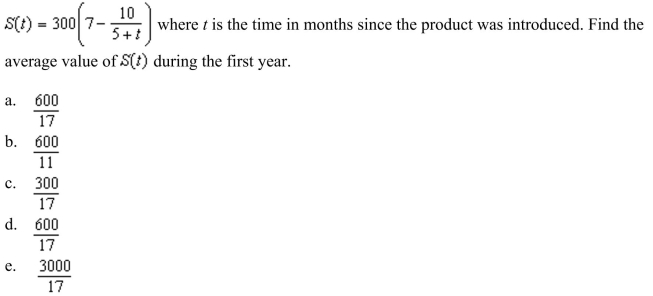


Unlock Deck
Unlock for access to all 147 flashcards in this deck.
Unlock Deck
k this deck
24
Identify the open intervals on which the function  increasing or decreasing.
increasing or decreasing. 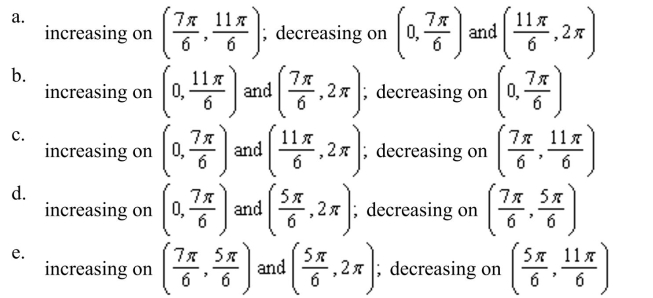
 increasing or decreasing.
increasing or decreasing. 

Unlock Deck
Unlock for access to all 147 flashcards in this deck.
Unlock Deck
k this deck
25
company introduces a new product for which the number of units sold S is 


Unlock Deck
Unlock for access to all 147 flashcards in this deck.
Unlock Deck
k this deck
26
Determine whether the Mean Value Theorem can be applied to the function 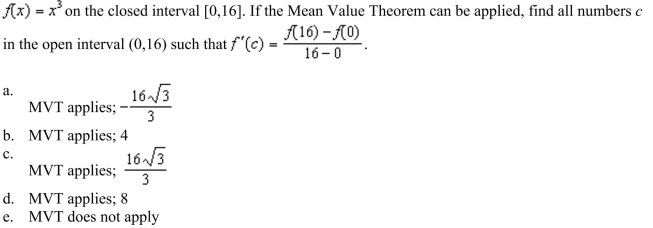


Unlock Deck
Unlock for access to all 147 flashcards in this deck.
Unlock Deck
k this deck
27
plane begins its takeoff at 2:00 P.M. on a 2200-mile flight. After 12.5 hours, the plane arrives at its destination. Explain why there are at least two times during the flight when the
Speed of the plane is 100 miles per hour.
A)By the Mean Value Theorem, there is a time when the speed of the plane must equal the average speed of 303 mi/hr.The speed was 100 mi/hr when the plane was accelerating to
303 mi/hr and decelerating from 303 mi/hr.
B)By the Mean Value Theorem, there is a time when the speed of the plane must equal the average speed of 152 mi/hr.The speed was 100 mi/hr when the plane was accelerating to
152 mi/hr and decelerating from 152 mi/hr.
C)By the Mean Value Theorem, there is a time when the speed of the plane must equal the average speed of 88 mi/hr.The speed was 100 mi/hr when the plane was accelerating to 88
Mi/hr and decelerating from 88 mi/hr.
D)By the Mean Value Theorem, there is a time when the speed of the plane must equal the average speed of 117 mi/hr.The speed was 100 mi/hr when the plane was accelerating to
117 mi/hr and decelerating from 117 mi/hr.
E)By the Mean Value Theorem, there is a time when the speed of the plane must equal the average speed of 176 mi/hr.The speed was 100 mi/hr when the plane was accelerating to
176 mi/hr and decelerating from 176 mi/hr.
Speed of the plane is 100 miles per hour.
A)By the Mean Value Theorem, there is a time when the speed of the plane must equal the average speed of 303 mi/hr.The speed was 100 mi/hr when the plane was accelerating to
303 mi/hr and decelerating from 303 mi/hr.
B)By the Mean Value Theorem, there is a time when the speed of the plane must equal the average speed of 152 mi/hr.The speed was 100 mi/hr when the plane was accelerating to
152 mi/hr and decelerating from 152 mi/hr.
C)By the Mean Value Theorem, there is a time when the speed of the plane must equal the average speed of 88 mi/hr.The speed was 100 mi/hr when the plane was accelerating to 88
Mi/hr and decelerating from 88 mi/hr.
D)By the Mean Value Theorem, there is a time when the speed of the plane must equal the average speed of 117 mi/hr.The speed was 100 mi/hr when the plane was accelerating to
117 mi/hr and decelerating from 117 mi/hr.
E)By the Mean Value Theorem, there is a time when the speed of the plane must equal the average speed of 176 mi/hr.The speed was 100 mi/hr when the plane was accelerating to
176 mi/hr and decelerating from 176 mi/hr.

Unlock Deck
Unlock for access to all 147 flashcards in this deck.
Unlock Deck
k this deck
28
height of an object t seconds after it is dropped from a height of 250 meters is 


Unlock Deck
Unlock for access to all 147 flashcards in this deck.
Unlock Deck
k this deck
29
Determine whether Rolle's Theorem can be applied to the function 
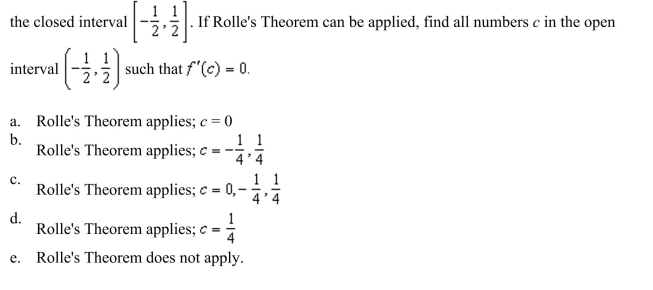



Unlock Deck
Unlock for access to all 147 flashcards in this deck.
Unlock Deck
k this deck
30
Determine whether the Mean Value Theorem can be applied to the function 


Unlock Deck
Unlock for access to all 147 flashcards in this deck.
Unlock Deck
k this deck
31
Determine whether the Mean Value Theorem can be applied to the function 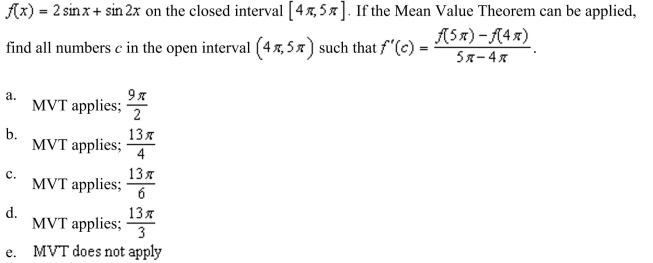


Unlock Deck
Unlock for access to all 147 flashcards in this deck.
Unlock Deck
k this deck
32
Determine whether Rolle's Theorem can be applied to the function 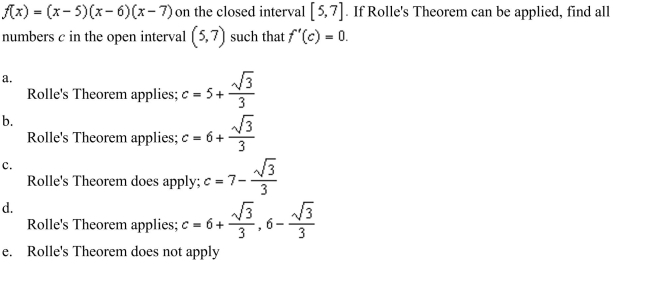


Unlock Deck
Unlock for access to all 147 flashcards in this deck.
Unlock Deck
k this deck
33
 decreasing.
decreasing. 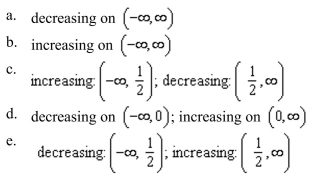

Unlock Deck
Unlock for access to all 147 flashcards in this deck.
Unlock Deck
k this deck
34
Which of the following functions passes through the point 
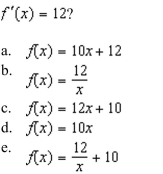



Unlock Deck
Unlock for access to all 147 flashcards in this deck.
Unlock Deck
k this deck
35
Determine whether Rolle's Theorem can be applied to the function 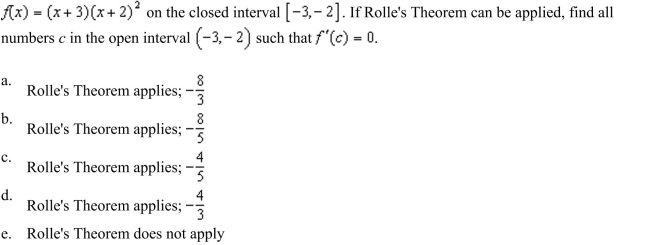


Unlock Deck
Unlock for access to all 147 flashcards in this deck.
Unlock Deck
k this deck
36

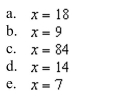

Unlock Deck
Unlock for access to all 147 flashcards in this deck.
Unlock Deck
k this deck
37
Determine whether Rolle's Theorem can be applied to 




Unlock Deck
Unlock for access to all 147 flashcards in this deck.
Unlock Deck
k this deck
38
a function f that has derivative  the point (5,6).
the point (5,6). 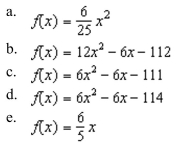
 the point (5,6).
the point (5,6). 

Unlock Deck
Unlock for access to all 147 flashcards in this deck.
Unlock Deck
k this deck
39
ordering and transportation cost C for components used in a manufacturing 


Unlock Deck
Unlock for access to all 147 flashcards in this deck.
Unlock Deck
k this deck
40
 intervals on which the function is increasing or decreasing.
intervals on which the function is increasing or decreasing. 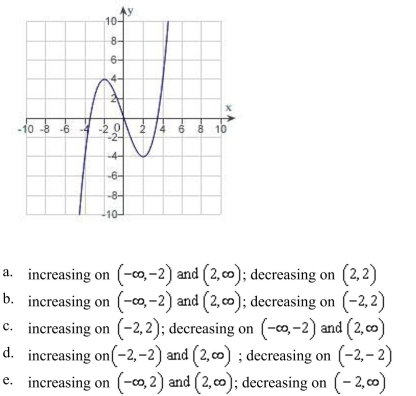

Unlock Deck
Unlock for access to all 147 flashcards in this deck.
Unlock Deck
k this deck
41
 interval Round numerical values in your answer to three decimal places.
interval Round numerical values in your answer to three decimal places. 

Unlock Deck
Unlock for access to all 147 flashcards in this deck.
Unlock Deck
k this deck
42
the points of inflection and discuss the concavity of the function. 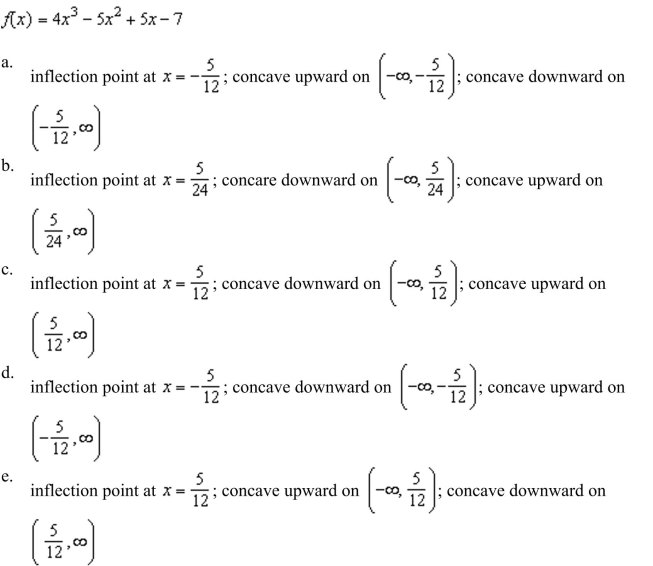


Unlock Deck
Unlock for access to all 147 flashcards in this deck.
Unlock Deck
k this deck
43
 Derivative Test.
Derivative Test. 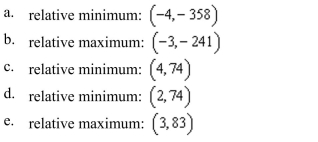

Unlock Deck
Unlock for access to all 147 flashcards in this deck.
Unlock Deck
k this deck
44
Determine the open intervals on which the graph of  is concave downward or concave upward.
is concave downward or concave upward. 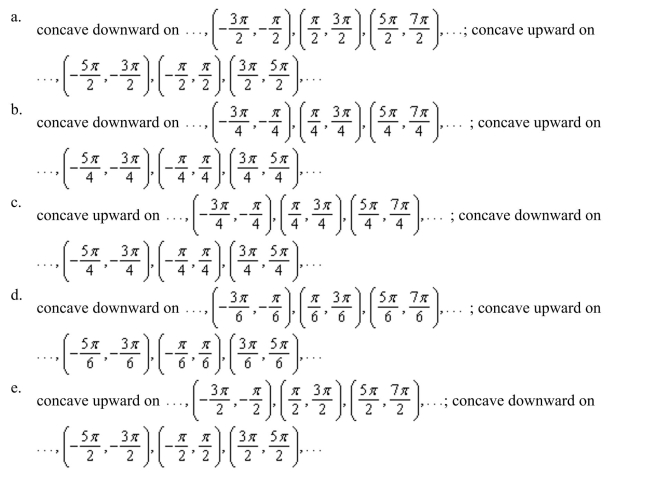
 is concave downward or concave upward.
is concave downward or concave upward. 

Unlock Deck
Unlock for access to all 147 flashcards in this deck.
Unlock Deck
k this deck
45
the points of inflection and discuss the concavity of the function 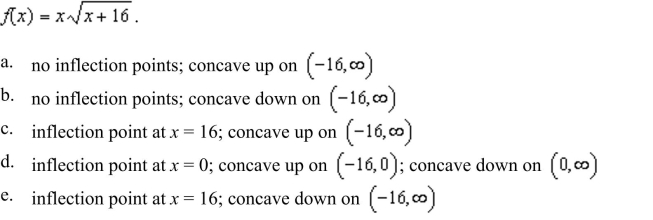


Unlock Deck
Unlock for access to all 147 flashcards in this deck.
Unlock Deck
k this deck
46
resistance R of a certain type of resistor is  where R is measured in ohms and the temperature T is measured in degrees Celsius. Use a computer algebra
where R is measured in ohms and the temperature T is measured in degrees Celsius. Use a computer algebra
System to find
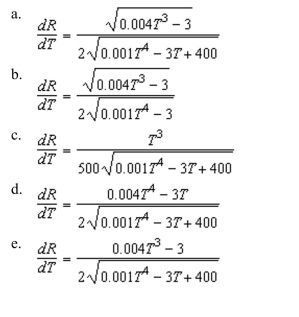
 where R is measured in ohms and the temperature T is measured in degrees Celsius. Use a computer algebra
where R is measured in ohms and the temperature T is measured in degrees Celsius. Use a computer algebraSystem to find



Unlock Deck
Unlock for access to all 147 flashcards in this deck.
Unlock Deck
k this deck
47
all points of inflection on the graph of the function 
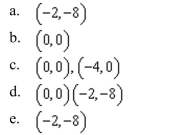



Unlock Deck
Unlock for access to all 147 flashcards in this deck.
Unlock Deck
k this deck
48
Determine the open intervals on which the graph of the function  concave upward or concave downward.
concave upward or concave downward. 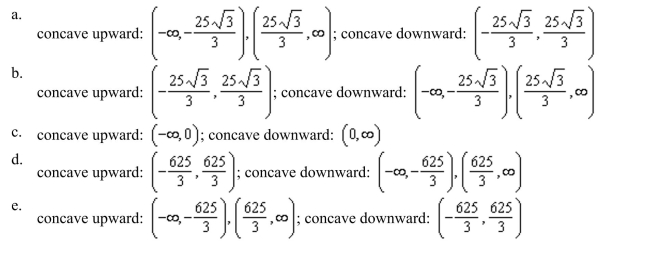
 concave upward or concave downward.
concave upward or concave downward. 

Unlock Deck
Unlock for access to all 147 flashcards in this deck.
Unlock Deck
k this deck
49
 the First Derivative Test. Round numerical values in your answer to three decimal places.
the First Derivative Test. Round numerical values in your answer to three decimal places. 

Unlock Deck
Unlock for access to all 147 flashcards in this deck.
Unlock Deck
k this deck
50

 Then use a graphing utility to confirm your results.
Then use a graphing utility to confirm your results. 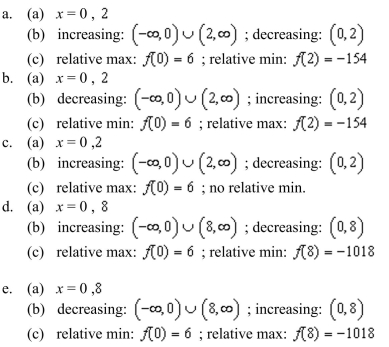

Unlock Deck
Unlock for access to all 147 flashcards in this deck.
Unlock Deck
k this deck
51
ball bearing is placed on an inclined plane and begins to roll. The angle of 


Unlock Deck
Unlock for access to all 147 flashcards in this deck.
Unlock Deck
k this deck
52
 (a) Find the critical numbers of f (if any); (b) Find the open intervals where the function is increasing or decreasing; and
(a) Find the critical numbers of f (if any); (b) Find the open intervals where the function is increasing or decreasing; and(c) Apply the First Derivative Test to identify all relative extrema.
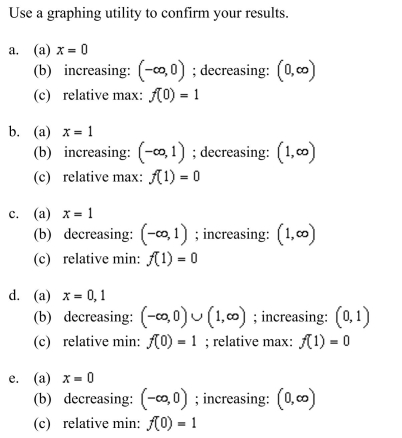

Unlock Deck
Unlock for access to all 147 flashcards in this deck.
Unlock Deck
k this deck
53
Determine the open intervals on which the graph of the function 
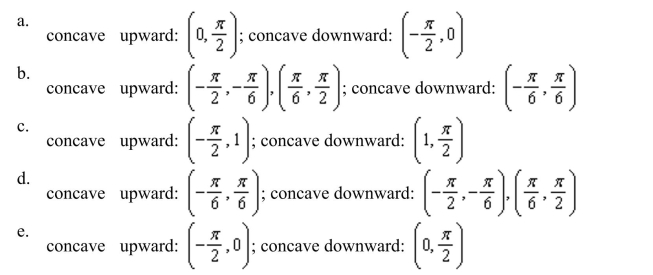



Unlock Deck
Unlock for access to all 147 flashcards in this deck.
Unlock Deck
k this deck
54
 downward or concave upward.
downward or concave upward. 

Unlock Deck
Unlock for access to all 147 flashcards in this deck.
Unlock Deck
k this deck
55
the open interval(s) on which the function  is increasing in the interval Round numerical values in your answer to three decimal places.
is increasing in the interval Round numerical values in your answer to three decimal places. 
 is increasing in the interval Round numerical values in your answer to three decimal places.
is increasing in the interval Round numerical values in your answer to three decimal places. 

Unlock Deck
Unlock for access to all 147 flashcards in this deck.
Unlock Deck
k this deck
56
 concave downward or concave upward.
concave downward or concave upward. 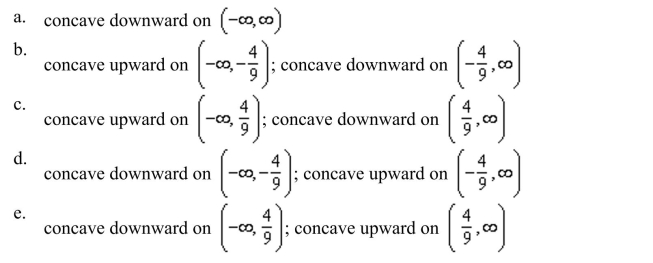

Unlock Deck
Unlock for access to all 147 flashcards in this deck.
Unlock Deck
k this deck
57
the relative minima of  the First Derivative Test. Round numerical values in your answer to three decimal places.
the First Derivative Test. Round numerical values in your answer to three decimal places. 
 the First Derivative Test. Round numerical values in your answer to three decimal places.
the First Derivative Test. Round numerical values in your answer to three decimal places. 

Unlock Deck
Unlock for access to all 147 flashcards in this deck.
Unlock Deck
k this deck
58

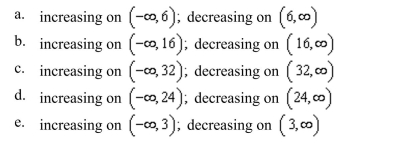

Unlock Deck
Unlock for access to all 147 flashcards in this deck.
Unlock Deck
k this deck
59
 measured in ohms and the temperature T is measured in degrees Celsius. Use a computer algebra system to find the critical number of the function. Round numerical values in your answer to the
measured in ohms and the temperature T is measured in degrees Celsius. Use a computer algebra system to find the critical number of the function. Round numerical values in your answer to theNearest whole number.
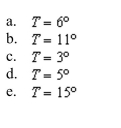

Unlock Deck
Unlock for access to all 147 flashcards in this deck.
Unlock Deck
k this deck
60
ball bearing is placed on an inclined plane and begins to roll. The angle of 


Unlock Deck
Unlock for access to all 147 flashcards in this deck.
Unlock Deck
k this deck
61
Suppose a manufacturer has determined that the total cost C of operating a factory is 
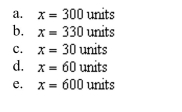



Unlock Deck
Unlock for access to all 147 flashcards in this deck.
Unlock Deck
k this deck
62
all relative extrema of the function  . Use the Second Derivative Test where applicable.
. Use the Second Derivative Test where applicable. 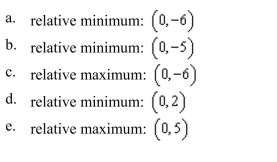
 . Use the Second Derivative Test where applicable.
. Use the Second Derivative Test where applicable. 

Unlock Deck
Unlock for access to all 147 flashcards in this deck.
Unlock Deck
k this deck
63
Match the function  with one of the following graphs.
with one of the following graphs. 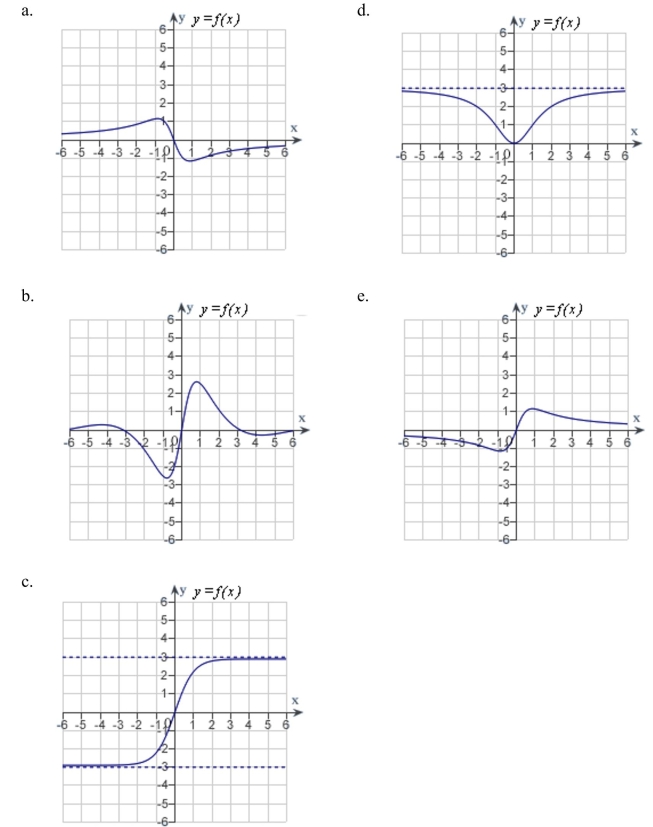
 with one of the following graphs.
with one of the following graphs. 

Unlock Deck
Unlock for access to all 147 flashcards in this deck.
Unlock Deck
k this deck
64
all relative extrema of the function  . Use the Second Derivative Test where applicable.
. Use the Second Derivative Test where applicable. 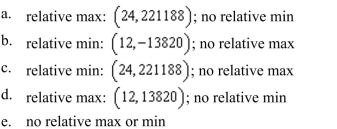
 . Use the Second Derivative Test where applicable.
. Use the Second Derivative Test where applicable. 

Unlock Deck
Unlock for access to all 147 flashcards in this deck.
Unlock Deck
k this deck
65

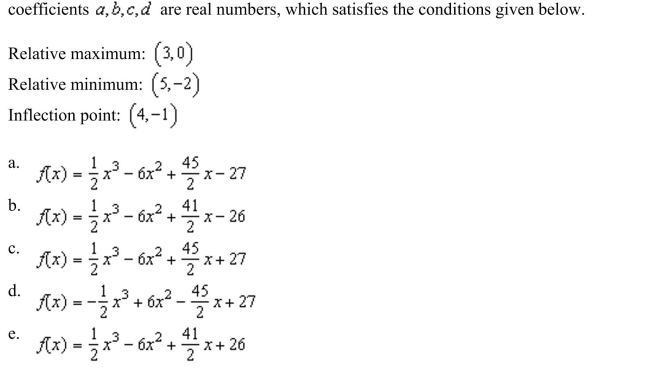

Unlock Deck
Unlock for access to all 147 flashcards in this deck.
Unlock Deck
k this deck
66
all relative extrema of the function  . Use the Second Derivative Test where applicable.
. Use the Second Derivative Test where applicable. 
 . Use the Second Derivative Test where applicable.
. Use the Second Derivative Test where applicable. 

Unlock Deck
Unlock for access to all 147 flashcards in this deck.
Unlock Deck
k this deck
67
all points of inflection on the graph of the function 
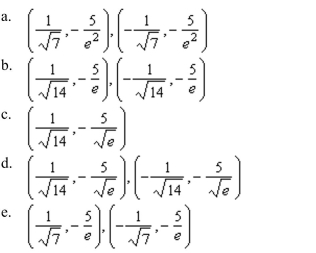



Unlock Deck
Unlock for access to all 147 flashcards in this deck.
Unlock Deck
k this deck
68
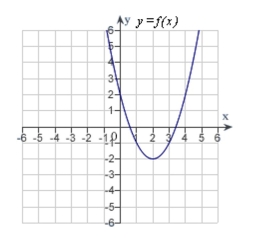
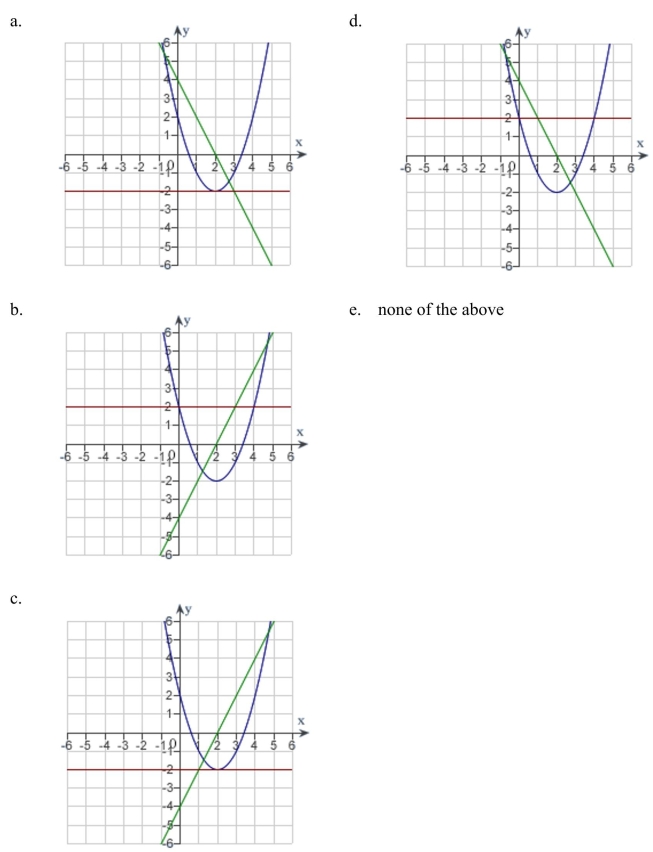

Unlock Deck
Unlock for access to all 147 flashcards in this deck.
Unlock Deck
k this deck
69
the points of inflection and discuss the concavity of the function 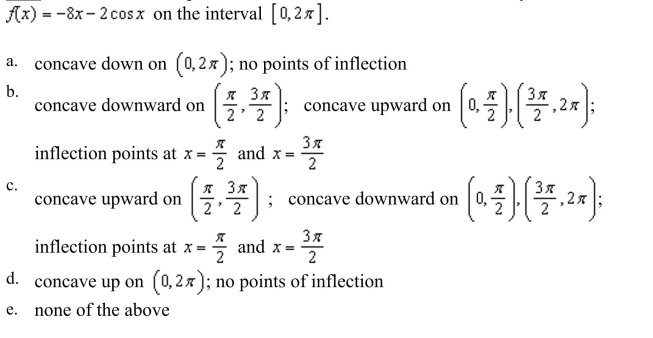


Unlock Deck
Unlock for access to all 147 flashcards in this deck.
Unlock Deck
k this deck
70
all points of inflection, if any exist, of the graph of the function 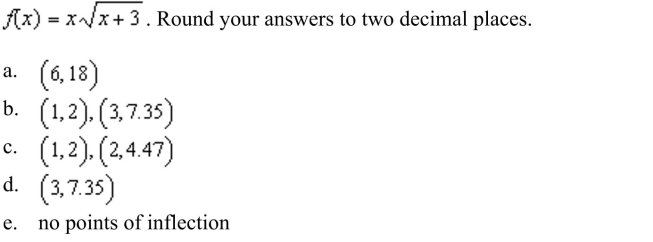


Unlock Deck
Unlock for access to all 147 flashcards in this deck.
Unlock Deck
k this deck
71

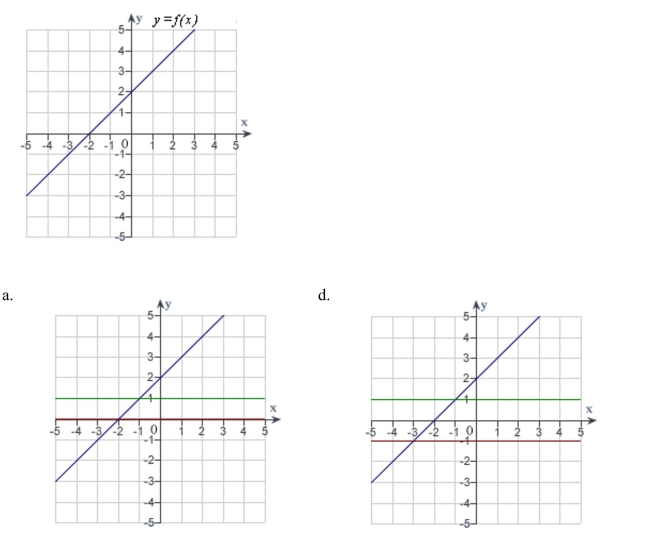
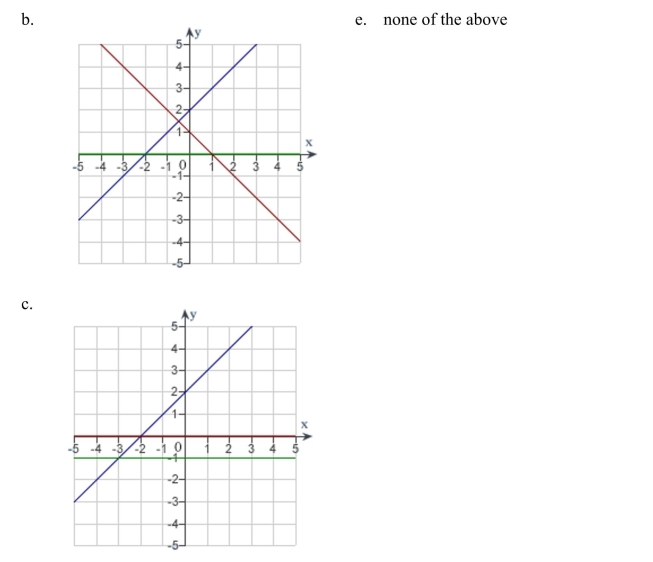


Unlock Deck
Unlock for access to all 147 flashcards in this deck.
Unlock Deck
k this deck
72
Locate any relative extrema and inflection points of the function  . Use a graphing utility to confirm your results.
. Use a graphing utility to confirm your results. 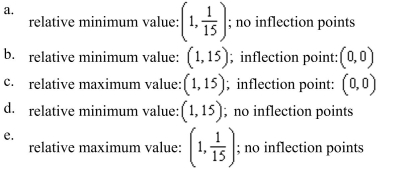
 . Use a graphing utility to confirm your results.
. Use a graphing utility to confirm your results. 

Unlock Deck
Unlock for access to all 147 flashcards in this deck.
Unlock Deck
k this deck
73
the points of inflection and discuss the concavity of the function  .
. 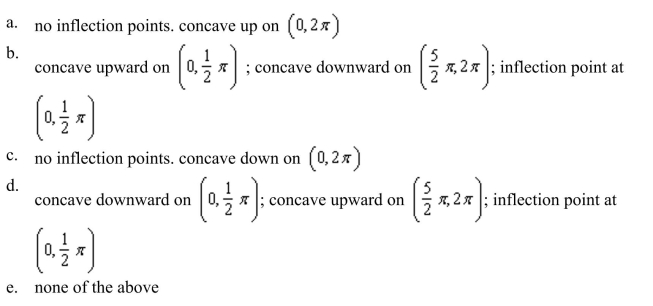
 .
. 

Unlock Deck
Unlock for access to all 147 flashcards in this deck.
Unlock Deck
k this deck
74
Suppose the deflection D of a beam of length L is  where
where  is the distance from one end of the beam. Find the value of x that yields the maximum deflection.
is the distance from one end of the beam. Find the value of x that yields the maximum deflection. 
 where
where  is the distance from one end of the beam. Find the value of x that yields the maximum deflection.
is the distance from one end of the beam. Find the value of x that yields the maximum deflection. 

Unlock Deck
Unlock for access to all 147 flashcards in this deck.
Unlock Deck
k this deck
75
Determine the x-coordinate(s) of any relative extrema and inflection points of the function 
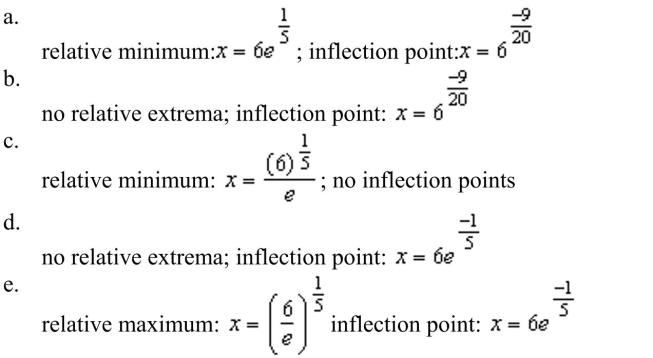



Unlock Deck
Unlock for access to all 147 flashcards in this deck.
Unlock Deck
k this deck
76
all points of inflection of the graph of the function  the interval . Round your answer to three decimal places wherever applicable.
the interval . Round your answer to three decimal places wherever applicable. 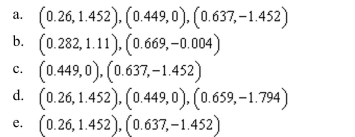
 the interval . Round your answer to three decimal places wherever applicable.
the interval . Round your answer to three decimal places wherever applicable. 

Unlock Deck
Unlock for access to all 147 flashcards in this deck.
Unlock Deck
k this deck
77
the point of inflection of the graph of the function  on the interval
on the interval 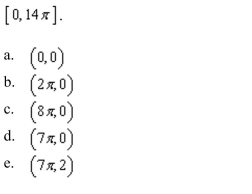
 on the interval
on the interval 

Unlock Deck
Unlock for access to all 147 flashcards in this deck.
Unlock Deck
k this deck
78
all relative extrema of the function  . Use the Second Derivative Test where applicable.
. Use the Second Derivative Test where applicable. 
 . Use the Second Derivative Test where applicable.
. Use the Second Derivative Test where applicable. 

Unlock Deck
Unlock for access to all 147 flashcards in this deck.
Unlock Deck
k this deck
79
Determine the x-coordinate(s) of any relative extrema and inflection points of the function 

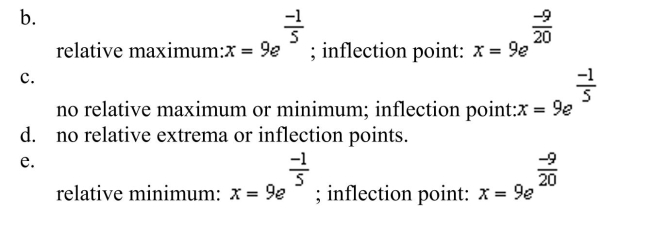




Unlock Deck
Unlock for access to all 147 flashcards in this deck.
Unlock Deck
k this deck
80

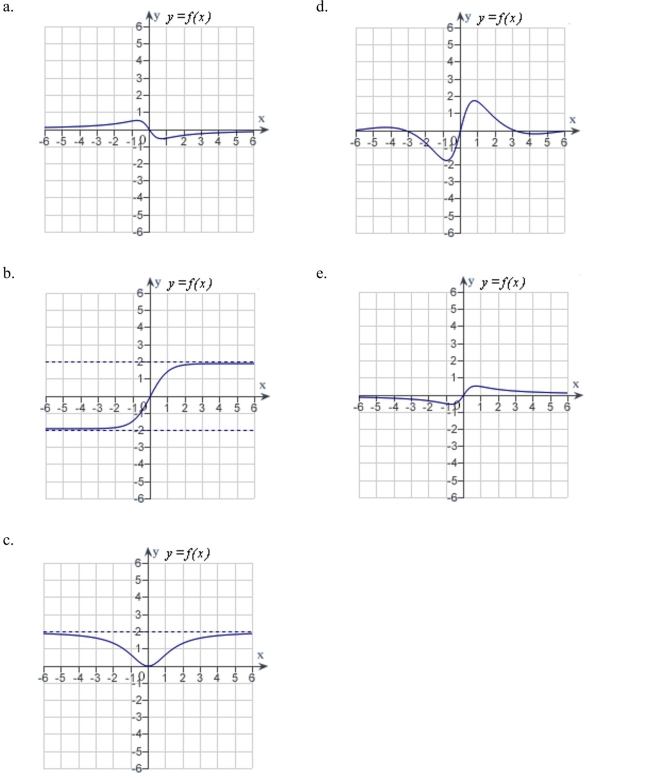

Unlock Deck
Unlock for access to all 147 flashcards in this deck.
Unlock Deck
k this deck


